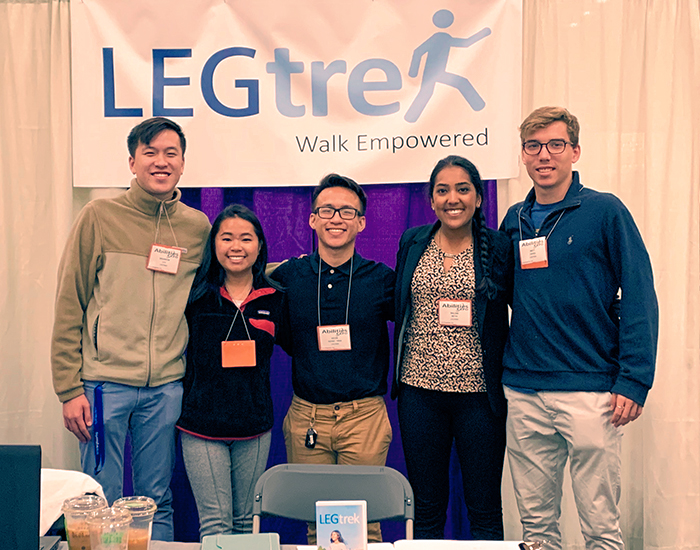For individuals with physical disabilities, finances can often be a barrier when it comes to obtaining medical devices that grant them the independence they desire. That is why LegTrek is on a mission to create an affordable assistive device for those with limited control of their lower limbs. Keck Graduate Institute (KGI) Master of Business and Science student Alice Wen, MBS '22, became Co-Founder and COO of LegTrek as an undergraduate at UC Santa Barbara (UCSB).
The LegTrek was developed by UCSB's engineering students for a capstone project. Sophie, a seventh-grade girl with cerebral palsy, was their inspiration for the product.
"She was full of energy, and she wanted a robotic device that would allow her to feel more independent," Wen said. "Her mom said she loves walking, but every time she walks she has to schedule it. People have to take her out of her wheelchair and put her in the gait trainer, strap her in, and she is only able to walk in short increments at most. That's not enough for a growing girl."
With Sophie's input, the engineering team built a prototype for a device that would allow individuals like Sophie to walk independently. UCSB's start-up Technology Management Program then helped LegTrek compete in the annual New Venture Competition, where the team won second place. Through the Technology Management Program, Wen joined LegTrek as the project aligned with her goal to work with innovative startups that serve unmet needs in the medical industry.
"That day, after meeting two of the original inventors of LegTrek, I googled the price of a power chair, and it was outrageous," Wen said. "The minimum baseline cost was 30 grand, and if you want anything else, the price goes up."
LegTrek, then, aims to offer a much more affordable assistive device with three key features: Motorized Gait Assistance that gives a natural feel for walking, a sit-to-stand mechanism that allows the user to quickly transform the LegTrek from a powerchair to a motorized gait trainer, and Variable Weight Support that allows the user to control how much of their weight is offloaded by the device.
Because Wen believes so strongly in LegTrek's mission, she has continued to work with the company while attending KGI. Guided by a dynamic team of advisors including physical therapists and a medical device consultant, they are currently finishing the product development process of a sub-system of LegTrek, preparing it for clinical trials.
Two KGI professors, Master of Science in Medical Device Engineering Program Director Anna Hickerson and Occupational Therapy Doctorate Program Director Christy Billock, also provided guidance and connected Wen with individuals who would play a pivotal role in the company.
"When we were showcasing our device, one of the most heartwarming experiences involved a little boy," Wen said.
At first, he wasn't enthusiastic about the LegTrek. He said that prototype was too bulky, and that he wouldn't be able to walk in the hallways with it.
"We said, 'Imagine if it wasn't bulky,'" Wen said. "'Imagine that you're able to sit and stand whenever you want to without ever having to push yourself out of your wheelchair and grab your gait trainer or bring your walker with you everywhere.'"
The boy became so excited to try the LegTrek that he got out of his wheelchair and almost fell. They then had to explain to him that it was just a prototype and not safe to use.
"It was hard explaining to the boy that he couldn't try it," Wen said.
"Now, every time there's a hurdle, I replay that moment and tell myself that we're not doing it for us, we're doing it for that one kid who jumped out of his chair."
In the future, Wen plans to go into biotech management.
"Management suits my personality the best and has the most room for creativity and problem-solving," Wen said. "One of my goals is to work for a pharmaceutical company. I want to be in that room where we determine how much the drugs cost, and I am going to fight to keep it low."
